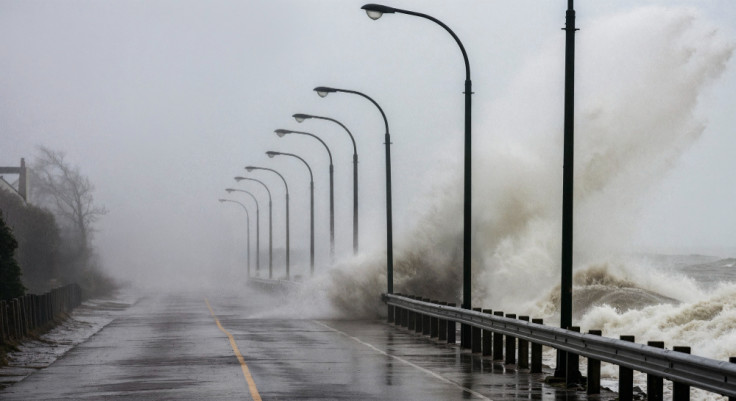Storm Floris May Cost Millions as UK Businesses Close and Travel Grinds to a Halt
Fierce 90mph winds and torrential rain have closed high streets, halted major events and brought UK transport to a standstill.

Britain is reeling from the devastating impact of Storm Floris, a violent weather system that has unleashed gusts of up to 90mph alongside relentless torrential rain, triggering flash flood warnings and causing disruption nationwide.
The Met Office issued an amber warning for wind as Storm Floris struck Scotland and parts of northern England, warning of 'widespread disruption and difficult conditions on roads and public transport' with gusts reaching 'up to 90mph in exposed locations'. Strong winds of 40–70mph have been recorded more widely inland.
The storm has shut down transport links, forced widespread business closures, and is expected to cost the economy tens of millions of pounds. Network Rail confirmed significant service disruptions, stating:
'With the severity of Storm Floris becoming clear, our priority is the safety of our passengers and colleagues. That is why we've taken the decision to close some parts of Scotland's Railway early on Monday as the worst of the conditions hit the country. Our engineers will also need to thoroughly inspect the network for any damage before we reopen the lines and restart train services on Tuesday morning.'
Widespread Business Closures
Storm Floris has forced many businesses to shut their doors temporarily, particularly in areas affected by flooding. Retailers, hospitality venues and service providers have reported sharp declines in footfall as customers stayed home to avoid hazardous weather conditions.
The British Retail Consortium (BRC) has publicly reported that extreme weather, combined with subdued consumer confidence, contributed to lower retail footfall in recent weeks. The organisation noted that high streets have been particularly affected, with the combination of extreme heat earlier in the summer followed by severe thunderstorms discouraging visits. Retailers are finding it increasingly challenging to draw customers into stores during periods of such disruptive weather.
According to BRC-Sensormatic IQ data, overall UK footfall in June 2025 fell by 1.8% compared to the same month the previous year, with high streets seeing a 3% drop. The BRC warns that ongoing weather disruption could further dampen consumer confidence, potentially slowing recovery efforts in the post-pandemic economy.
The Royal Edinburgh Military Tattoo and multiple ferry routes were cancelled, while several train services were suspended due to fallen trees and dangerous winds, compounding the UK's transport difficulties.

Transport Chaos Hits Commuters and Freight
Flooded roads, debris on rail lines and fallen trees have caused widespread cancellations and delays to public transport. The Department for Transport estimates that such disruption could cost the UK economy tens of millions of pounds in lost productivity. Freight delays are also threatening supply chains, particularly for perishable goods.
Ross Moran, Network Rail's route director for Scotland, added:
'Weather specialists, based in our control room, will monitor conditions closely throughout the storm, and our teams on the ground will be ready to deal with any issues caused by the weather as quickly as possible. We appreciate passengers' patience while we get through this unprecedented summer storm.'
Insurance Claims Expected to Surge
The Association of British Insurers (ABI) has warned that recent storms have already driven weather-related payouts to a record £585 million, with Storm Floris expected to add significantly to that total.
The ABI is urging affected homeowners and businesses to contact insurers promptly and to keep detailed records of any damage or repairs. It has also noted that the sustained high cost of extreme weather has been reflected in rising premiums, with the average combined buildings and contents home insurance premium increasing by 16% in 2024.
Climate Change Link
Climate scientists emphasise the increasing influence of climate change on the severity of UK storms. Warming oceans and shifting atmospheric patterns are increasing the amount of moisture in the air, making storms like Floris more intense and more frequent.
Experts warn that such extreme events highlight the urgent need for the UK to strengthen flood defences, upgrade transport infrastructure, and enhance emergency response systems to better cope with the effects of a changing climate.
© Copyright IBTimes 2025. All rights reserved.




















